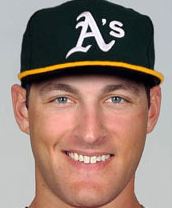By Scott Barancik, editor
Aaron Poreda, a 6-foot-6-inch pitcher whose rapid rise to the Majors was matched by a swift decline, has signed a minor-league deal with the Texas Rangers after a long layoff for “Tommy John” surgery.
Poreda, 27, told Jewish Baseball News that Texas was one of 8 to 10 teams that sent scouts to watch him work out at a recent showcase in Arizona. “An hour later, we get a call from John Daniels, the G.M. of the Texas Rangers. He said, ‘We’re very interested in Aaron. Don’t sign with any other team until you talk with us first,'” Poreda recalled. “I was on cloud nine.”
Under the deal, Poreda will participate in the Rangers’ major-league spring training camp and fight for a spot on the team’s starting rotation. If Texas decides he needs a bit more polishing — it will have been two years since he last played competitively, for the Pittsburgh Pirates’ Double-A squad — he’ll start the season with the Rangers’ Triple-A team, the Round Rock Express. Either way, he’ll be accompanied by his wife of one year, Melissa.
An avid football player in high school, the northern California native was lightly recruited by college baseball teams before ending up at the University of San Francisco. Three years later, in 2007, he was a first-round draft pick of the Chicago White Sox. Two years after that, at the raw age of 22, he made his Major League debut.
But later that season, Chicago surprised Poreda by sending him and several others to the San Diego Padres for Jake Peavy. Before long, the fastball pitcher known for his control was walking batters left and right. “When I got traded is when the wheels started to come off,” he said. Part of the problem was mental. What Poreda didn’t know at the time was that the ulnar collateral ligament (UCL) in his throwing elbow was starting to tear.
Fast forward to the 2012 season. After several attempts to heal his elbow without going under the knife, Poreda agreed to let noted surgeon Dr. James Andrews replace the torn ligament in his elbow with a tendon from his hamstring. Several months later, the Pirates released him. When no one picked him up, many fans — including this website — assumed Poreda had retired.
But in an interview with Jewish Baseball News, Poreda said he never gave up on his baseball career, and in fact has spent the 13 months since Tommy John surgery painstakingly returning to form, as well as adding a new pitch or two to his repertoire.
Below is an edited transcript.
JBN: You were a first-round draft pick in 2007. What do you think the Chicago White Sox saw in a young Aaron Poreda?
Poreda: Well, they saw a big, left-handed guy with a plus-plus fastball with depth and a lot of movement. A lot of people said I was a raw guy who could be molded into whatever they wanted. I saw myself as more polished. I didn’t have the change-up I have today, but I had a fastball, and I was able to get ahead with that and finish people with the slider, keep them off balance, and throw the change-up periodically when it was on. The rule of thumb, they say, for Major League starters is you need three pitches. Except for a couple of exceptions, like Randy Johnson and a couple others that had such a great fastball, they were able to get away with two. I was actually throwing a curveball back in college, it was just a fastball-curveball, but I probably threw 90-95 percent fastballs. I think they saw that upside to me, they saw a big, strong guy that threw hard and threw strikes, and they wanted to move me up quickly.
JBN: And your fastball at that point was topping out at what?
Poreda: When I got drafted, I topped out at 97 [mph].
JBN: You were picked in the first round. How much pressure did you feel to perform?
Poreda: Actually, it fueled my fire, it made me more focused. It was exciting, I’d never had that kind of publicity and the amount of scouts and the attention ever in my life. So it was a lot of fun…Once you cross the white line, it’s game time…You see the radar guns once or twice, and I might’ve pumped-up a little bit extra, but for the most part I just went out there and did my thing. My bread and butter was throwing into righties and away to lefties, and just going with a glove-high fastball in-in-in until they could hit it, and then once they proved they could hit it, start going outside, start mixing offspeed, and stuff like that.
JBN: How heavily recruited were you — or weren’t you — out of high school?
Poreda: There was a little interest, but not too much. Back in high school, I was throwing, in my senior year, mid-80s. And I loved playing football too, so growing up, through my senior year in high school, I actually wanted to be a professional football player. So instead of going to showcases and playing baseball year-round, I was playing football. I was a defensive lineman, offensive lineman, and tight end. I grew up playing quarterback, but I just didn’t think I was going to get the starting job. I actually regret not even trying out [in high school]…But I enjoy pitching a lot more than I did blocking. I loved the contact, I miss the contact and the physical exertion in football, but in the end, I like having the ball in my hand.
JBN: Did college football programs try to recruit you?
Poreda: I got some interest from UNR [University of Nevada-Reno]. We used to go up there during the summers, and they’d have a huge football camp with 10, 20 different high schools, so I won some tight-end awards up there. And if I would’ve pursued it, I probably would’ve gone there. But I had a lot more success in baseball, and my mom also didn’t think highly of me pursuing a career in football.
JBN: You began in the minors in 2007, had a very good couple of years, made your Major League debut in 2009. And then midyear, the White Sox traded you and a few others to San Diego for Jake Peavy. How did you feel?
Poreda: I was actually a little disappointed that the White Sox let me go. When you get drafted, you think that they really think highly of you, and you can’t help but think about your future in Chicago, or whatever big-league team you’re with. So when you get traded, it feels like you really don’t mean much to the franchise. I found out, and a lot of people find out through their careers in professional baseball, that everyone can be traded, everyone can be cut, everyone can be used as a chess piece to better the organization. You can’t take it personally…
JBN: Did it prove to be a good move for you?
Poreda: Actually, when I got traded is when the wheels started to come off a little bit. It was hard for me to go back and forth from bullpen to starter …My fastball had too much cut and was almost uncontrollable, so my walks went up…and something wasn’t right. And the Padres really weren’t giving me any answers. They were just letting me struggle, and I really didn’t know which way was up. [Laughs] They called me up in September just as a formality, I think, to show the fans who they traded for…I didn’t do too bad there, but I was still wild. I wasn’t the same Aaron Poreda that worked his way up to the minors and was throwing all those innings and putting up all those numbers in minor-league ball.
JBN: Looking back, why do you think you began to have control problems?
Poreda: I think my elbow was starting to get tight. And I didn’t even know it, but my body was compensating. It didn’t feel like it was hurt. But I stopped bending my elbow as much as I usually did, and I think the pressure of the big leagues and getting traded and all those variables mixed into it got my mechanics off. I really didn’t know how to fix it. I started trying to throw harder and harder, instead of using my whole body…For me, pitching-wise, I’m really smooth and nice and easy, and it looks like it’s effortless. Eventually, my elbow just gave out.
JBN: Did you have anyone you could turn to for help?
Poreda: For the remainder of that year, I didn’t. There was a Triple-A guy, and I talked to Buddy Black, the G.M. with the Padres, and they didn’t have really have any answers for me. So I ended up going back to my old high-school coach, who had really taught me to be mechanically sound…He helped me to straighten out my fastball and get a little more accurate. But once the season started, I saw the same cut and the same kind of uncontrollable pitching that I was never accustomed to. And that snowballed, and it just ended up giving me the yips. So I was tentative to throw because I didn’t trust my body, and I was probably at the lowest point of my career, so much so that I contemplated giving it up. I was not myself.
JBN: You ended the 2009 season on the Major League roster, but 2010 was a different story.
Poreda: They brought me down to Double-A, in the bullpen. I was a long-relief, mop-up guy. I still was putting up pretty good numbers, but the walks were still up. I was pitching my butt off, trying to do everything I could to keep throwing strikes and have some success…I was doing a little bit better, but still, there was no consistency. They really just put me in the back of the pack, and I got innings when the score was just out of control, whether we were losing by 10 runs, up by 10 runs…
JBN: Is that when you realized there was something wrong with your elbow?
Poreda: It wasn’t until I was with the Pirates [in 2012] that I really started to figure out my body and everything I was doing wrong. And by the time I did that, my arm was already falling off, and I knew it was just a matter of time until it gave out.
JBN: Did you opt for Tommy John surgery right away?
Poreda: No. They said it was a partial tear and there was a chance I could recover from it without surgery…so I rehabbed [the elbow] for a couple months and got all the way back to the mound, and when I really started to let it go, it was too painful. So I went back to the doctor…It’ll be almost two years since I’ll have pitched competitively going into next year’s Spring Training, because there’s five or six months of trying to rehab without surgery, then I get the surgery, then it’s another 13 months post-op. I’m ready to get back.
JBN: Was there any doubt in your mind that you’d resume playing baseball?
Poreda: I was 100% determined. I knew that I had a really good chance going into it, and I’d seen a lot of guys a lot smaller than me come back. I’ve always thought that I was a big guy, that my body would bend but never break. I was confident in my work ethic and my rehab and the trainers that were helping me out…But sometimes, you do question it, because you keep on pushing the envelope and you get to a certain plateau and your arm gets sore and it just continues to stay sore, and you can’t really push through to the next barrier. And then you give it some time off and some rest and take some anti-inflammatories and get stretched out a little bit more and just be patient, and eventually you break through that barrier and get to the next barrier…
JBN: Recently you and your agent invited Major League scouts to watch you work out in Arizona. Was there a good turnout?
Poreda: There were probably 8 to 10 different teams there.
JBN: And the team that showed the most interest was the Texas Rangers.
Poreda: Yeah. They were pretty interested before the workout, and then after the workout, their scout stayed a bit longer to talk to us and ask me questions about my rehab…So we knew they were very interested. And then, an hour later, we get a call from John Daniels, the G.M. of the Texas Rangers. He said, “We’re very interested in Aaron. Don’t sign with any other team until you talk with us first.” And my agent was telling me it’s very unusual for a G.M. to call — especially on a Saturday afternoon when he’s hanging out with his kids — to talk business about a potential minor-league guy that’s coming back from Tommy John surgery.
JBN: That must’ve felt incredibly good.
Poreda: I was on cloud nine…I was originally thinking that I might be able to sign with a Bay Area team. I thought that’d be really cool, because [I’m from the area]…The Giants showed a little bit of interest, and they said, “You might be able to be a bullpen guy, we’re not sure if we’ll give you a big-league invite,” and yadda yadda. And Texas was saying, “We see him as a starter, we’re gonna let him compete for a job, we see him up with Texas next year, and we’re really excited, and we want him”…My whole career, I’ve followed the advice my parents gave me, which was, “Go with the team that wants you the most.”
JBN: So you’re going to be with the Major League squad for spring training, and hopefully you’ll stick on with the team, but if they decide you need a little bit more polishing, they’ll send you to Triple-A for a while?
Poreda: That’s what I’m expecting.
JBN: When you pitched for the scouts, how did your arsenal of pitches differ from when you were drafted?
Poreda: I basically was hoping to put on the same workout that they saw 4 or 5 years ago. But this time I had a good change-up, and it really was just to show them I’m a completely different guy from what you’ve seen the last couple of years, with the cut to the fastball and the erratic location and the velocity going down…I wanted to show them I was strong, healthy, poised, and that I can handle the pressure of a bunch of scouts watching me and being back up in the big leagues. So location and accuracy was the most important, and right from the get-go, I was throwing strikes, I was keeping the ball low — which is very important for the scouts — and my offspeed was working as well. My change-up and slider command could still get a little better, especially the slider…but I only started throwing that the past month or so, because it puts a lot more strain on your elbow than a fastball. So that’s one of the things in my rehab process that I’m still working on overcoming. I’m not 100% yet. I’m still critiquing some of the small details.
JBN: Were any family members at the showcase?
Poreda: My wife was there…She could tell as soon as I walked up next to her that I had done well because I had a huge smile on my face. This is only the first step to accomplishing my goal of being a big league starter. Now I need to compete when it counts.
# # #
Help keep Jewish Baseball News free! Use our Amazon.com link whenever you shop
Check out our daily Jewish Box Score via Twitter or Facebook

















